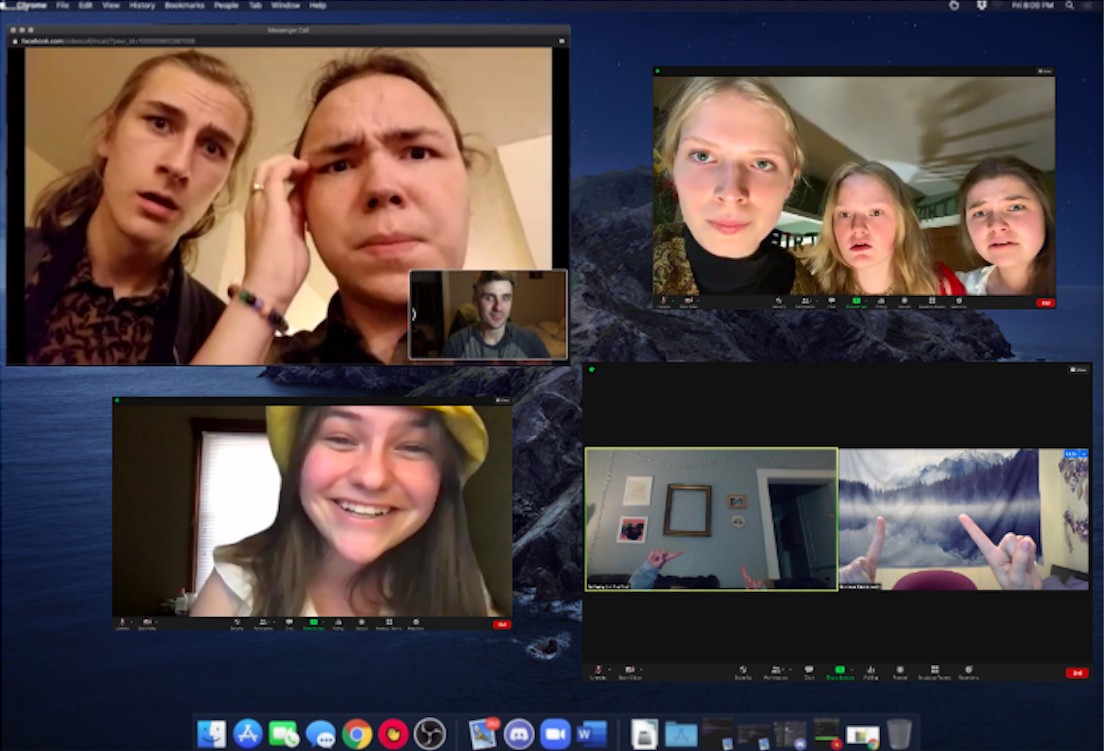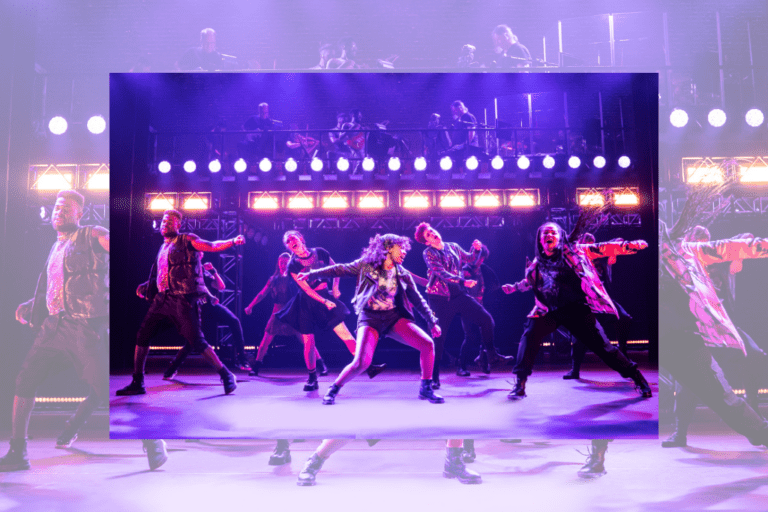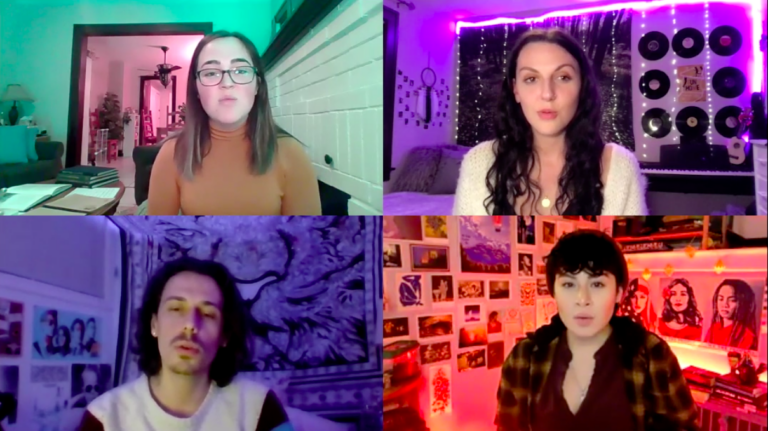Hope Springs Eternal in The Stream You Step In
It was a Zoom call that broke hearts and crushed dreams.
In June, I gathered with my colleagues and students in a grid of tiny digital squares to discuss what had become an inevitability: the cancellation of our theatre season. As Tina Pugliese, the head of the School of Dramatic Art, announced to our fourth-year BFA Acting class that we would not be proceeding with our plans to stage three shows in the fall, several squares in the grid blinked to black.
Sam Cranston, who was meant to play Jo in Little Women in our cancelled live season, recalls hearing the news about losing her dream role. “Right before the Zoom call happened, we have a group chat with our class, and everyone was kinda like, ‘Peace be with you; we’ll see you on the other side.’ We were all preparing for the worst and hoping for the best.” Like many of her classmates, Cranston turned her camera off upon hearing the news. “I didn’t want any of my professors to see me cry. I didn’t want to show them that I wasn’t grateful, but my heart was just broken.”
Graduating BFA Acting students at the University of Windsor are each guaranteed two mainstage roles in our season, which, in the before times, boasted six productions supported by a full-time design and technical staff, plus students and faculty from across the school. For many, the final season is the reward for sacrifices made over the last four years: spending grueling hours in the rehearsal hall radiating à la Michael Chekhov, accumulating mounds of student debt, and living away from their families in a city that smells like the fermenting whiskey produced by the century-old distillery at its core. Similar sacrifices are made by theatre students across the country, whom I’m sure faced similar disappointments when COVID-19 came for live performance.
On a Zoom call that confirmed our students’ worst fears for their final year, I was there to provide a glimmer of hope: a partnership with Outside the March to commission original digital plays for our graduating class. Under Mitchell Cushman’s creative leadership, we had secured a diverse group of writers from across the country—Elena Eli Belyea, Karen Hines, David Yee, and Marcus Youssef—to create new works specifically tailored to our students and the medium of Zoom. Presented as two double-bills, The Stream You Step In is an experiment in creating a communal theatre experience online.
Zoom theatre is now all too familiar to many theatre-makers who have moved onto the platform in an attempt to sustain their practice and their connection with their audiences. Still, the medium bears many challenges that have yet to be fully addressed, such as the reliability of performers’ internet connections, the creative team working in isolation, and the difficulty of capturing the sensation of liveness that theatre is known for. But Cushman insists that with these challenges comes much potential for immersive theatre companies like his own. “We are excited to explore all of the ways in which an online platform like Zoom can allow audiences a chance to have a two-way, implicated, intimate experience with these brand new works of theatre,” says Cushman. “These are four of Canada’s most exciting and innovative playwrights – and the perfect voices to chronicle and make sense of these unparalleled times we are all living through.”

(left to right) fight director Anita Nittoly and associate fight arranger James Eddy (top) in rehearsal with actors Dan Stanikowski, Evander Jack Dewar, and Gareth Finnigan (bottom) for David Yee’s good white men. Photo by Sébastien Heins.
Of its many unique benefits, Zoom expedites the development process for playwrights, allowing them to be responsive to the here and now. The typical development process for a new play in Canada involves months of workshopping and it can sometimes take years before it receives a full-fledged production, meaning that material meant to be socially and politically current can feel stale by the time it reaches the stage. Zoom, the technology of the moment, facilitates theatre of the moment. David Yee’s good white men and Marcus Youssef’s Thank You for Your Labour both explore urgent questions around allyship within anti-racist activism, taking inspiration from events that are still fresh in the minds of audiences and artists. They also take inspiration from the student performers themselves, who met with the playwrights in the summer before they started developing the material. For example, while Yee did not base his characters on the four actors assigned to him, their shared identities as four young, white men shaped the direction of his play. Three of the actors in good white men are roommates, which further shaped dramaturgical choices as Yee developed the play in rehearsals over the fall.
As the technology of the moment, Zoom also shapes dramatic form and structure. None of the scripts from The Stream You Step In could be done the same way—or even at all—without Zoom. Elena Eli Belyea’s The Jubilant tells the intertwined stories of four characters, one of whom is a YouTube star who interacts directly with the audience through the screen. As they prepare for their opening on November 19th, Belyea and director Kimberley McLeod are experimenting with how to immerse viewers in the performance. In rehearsals, cast members manipulate phone and laptop cameras to place audiences intimately close to the action, sometimes offering multiple angles on one scene—like a film shoot, but with actors as their own camera crew. As they continue to test the limits of Zoom, Belyea revises her script accordingly.

(left to right) Bethany Joy Radford and Marissa Rasmussen in a close-up shot during rehearsal for Elena Eli Belyea’s The Jubilant. Photo by Kaelee Brassard-Welch.
For the student performers, Zoom might also offer a way to heal a broken heart. Cranston has been cast in Karen Hines’ play The River of Forgetfulness, where she plays a version of herself playing Jo. Her first costume fitting happened outside of her home, not far from the campus where she used to spend most of her waking hours. Costume designer Agatha Knelsen delivered her corset and bone skirt and supervised at a safe distance while Jonnie Lombard, Cranston’s classmate and a member of her bubble, assisted with the fitting. It was an emotional moment for the two friends, who were reminded of what was lost in the pandemic—not only their coveted roles, they say, but those of the designers, technical crew, and myriad others who collaborate to make live theatre happen.
For Cranston, the moment was a reminder of what could have been. “Every night I would have put this corset on, I would have put this bone skirt on, I would have put this costume on, and I would have walked on stage as Jo. Having [Jonnie as] a costume mistress and having that backstage experience come to life in that moment, I got teary-eyed.” Adds Lombard, “It was a reminder of the connections that we had when we were all in classes with each other, and it’s nice to see that that doesn’t really go away, it just gets put on hold for a little bit.”

(left to right) Jonnie Lombard and Sam Cranston during their outdoor costume fitting. Photo by Agatha Knelsen.
Now that they have had time to process the change in plans for their final year of theatre school, Cranston and Lombard are focusing not on what they have lost, but on what they have gained. “This is something really cool, this would never have happened except for in these present circumstances. […] I would have loved to do the shows we had lined up for this year, but I can’t imagine not doing these ones instead. With time, these have become one of the most exciting things I’ve worked on as a young actor” says Lombard.
For these students, for all of us, these plays offer a way for us to be live together again until connections are restored IRL. In the next few weeks, we will publish about the creative process of The Stream You Step In in the hope of offering a window into this emerging form of theatre and how it is impacting the creative practices of emerging and seasoned artists alike.
The Stream You Step In runs November 5-9 and 19-22. For more information, visit http://outsidethemarch.ca/the-experiences/the-stream-you-step-in/











Comments